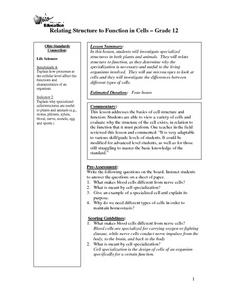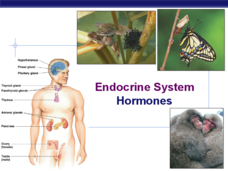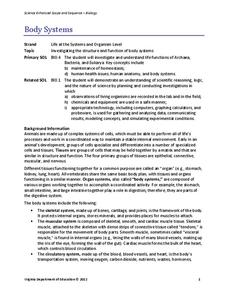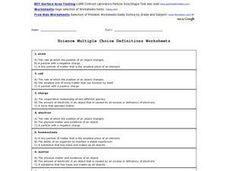Curated OER
Cell 5 Diffusion and Osmosis
Students distinguish between active and passive transport. Students identify key words associated with active and passive transport. They draw and explain the structure f the cellular membrane. They are able to define phospholipid...
Curated OER
How Do White Blood Cells Fight Foreign Organisms That Invade Our Body?
Ninth graders investigate the functions of white blood cells. They watch and discuss an online movie, conduct Internet research, and complete a worksheet.
Curated OER
Relating Structure to Function in Cells
Twelfth graders investigate specialized structures in both plants and animals. They relate structure to function, as they determine why the specialization is necessary and useful to the living organisms involved. They use microscopes...
Curated OER
It's Challenging Being Green!
Learners influence the plant life cycle as they take care of plants.In this caring for plants lesson, students understand the parts of the plant and their functions in keeping it alive. Learners participate in experiments with plants and...
NOAA
Vertebrates II
Mammals of the ocean unite! Or not. The 20th installment of a 23-part NOAA Enrichment in Marine sciences and Oceanography (NEMO) program investigates how warm-blooded marine mammals survive in water. In the class activity, learners use...
Curated OER
Endocrine System: Hormones
Almost a duplicate of another slideshow on our site, these slides covering classes of hormones and their function, have gaps prepared for your pupils to fill in. This copy could be printed out for your class to complete as notes during...
Virginia Department of Education
Body Systems
The human body is an amazing thing! Explore the body with your high school class as they investigate each system in detail. They learn components of each organ system and disease processes that can negatively affect general health and...
Biology Junction
Viruses, Viroids, and Prions
Are viruses living or non-living? According to the presentation, they are both and neither. Clearly, this requires clarification and an in-depth look at viruses, viroids, and prions. Young scientists learn about the history, structure,...
Curated OER
Respiration, Circulation, and Excretion
In this body systems activity, students read information about the respiratory, circulatory, and urinary system and then complete 5 short answer questions.
Curated OER
The Senses
In this senses worksheet, students use the terms listed on the eye to label the figure and describe how light entering the eye becomes an image seen. Then they name the three main sections of the ear and explain what the cochlea does.
Curated OER
ATP in a Molecule
In this cell energy worksheet, learners review how ATP is formed and broken down and the uses of cell energy. This worksheet has 8 fill in the blank and 2 short answer questions.
Curated OER
Breathing and Holding Your Breath
Five questions are presented and answered as a means of delivering information on the respiratory system. Using red and blue game chips, physiology learners model the movement of blood through the lungs. Groups of learners time how long...
Curated OER
Introduction to Human Anatomy & Physiology
If the only support you are in search of is lists of vocabulary terms, this presentation may fit the bill. Slides simply list terminology. These categories are included: hierarchy of structural organization, cell functions, cell...
Curated OER
Wilderness Survival: A Field Practicum
Students are provided with hands-on-field testing of authentic applications from principles pertaining to: Psychology A. Develop a positive, can-do attitude with a high degree of self-reliance that is transferable to human interactions...
Curated OER
Science Multiple Choice Words Worksheets
In this science activity, students choose the multiple choice science term that best matches the 15 definitions stated. Students circle their answers.
Curated OER
The Jelly Bean Problem
Students are challenged to eat some candy as a cell would need to do it. By solving this problem students simulate the cell process called endocytosis. They think about some of the problems that arise when a cell ingests food.
Curated OER
Flora and Fauna of the Hill Neighborhood
Students compare and contrast the characteristics of plants and animals. In this ecology activity, students observe the outdoors and describe the relationship among different living things. They relate plant diversity with animal diversity.
Curated OER
Making Connections
In this experimentation worksheet, students review the steps of setting up an experiment, determining the correct procedure and analyzing the data. This worksheet has 23 fill in the blank questions.
Curated OER
Moore S Word Search Puzzle 1
In this literacy learning exercise, students find the words that are in the word search puzzle that focus upon the vocabulary that is from the theme of the sheet.
Curated OER
Oxidation Numbers
In this oxidation numbers worksheet, students compare metals and nonmetals, draw Lewis Dot Diagrams, and determine the oxidation number for the given elements. This worksheet has 1 multiple choice, 5 short answer, and 12 fill in the...
Curated OER
What Happens When A Cell Divides?
Students investigate the cycle of mitosis. For this biology lesson, students discuss the different stages of mitosis through cell reproduction. They further their investigation through laboratory analysis.
Curated OER
Movement, it's FUN-damental!
High schoolers discover how muscles work. For this biology lesson, students explain the causes of fatigue and muscle soreness. They create graphs and compare results with their classmate.
Curated OER
Blood Business
Young scholars identify the different kinds of blood. In this biology lesson, students investigate the antigens, agglutinins and Rh factor using their own blood. They use Punnett squares to predict blood type of offspring.
Curated OER
Science Multiple Choice Definitions Worksheets
In this science worksheet, students choose the multiple choice answer that best defines each of 15 science related vocabulary words.

























